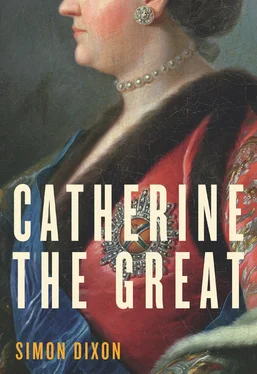As so often in her declining years, nervousness led to exhaustion and lapses in concentration. ‘The empress is not what she was,’ Stedingk reported privately to Gustav III at the end of the month. ‘Age and the inconveniences it brings render her less capable of doing business.’ 28But there was never anything pathetic about Catherine. ‘Angry,’ her secretary noted on 7 April, ‘obstinacy will lead to a new war.’ Since it is not always clear whose words Khrapovitsky is recording, it is hard to be sure whether this was the voice of Potëmkin, irritated by her refusal to appease the Prussians, or an expression of the empress’s own exasperation at the sabre-rattling in Whitehall and Potsdam. 29Whichever it was, Catherine held her nerve and was vindicated when British public opinion, encouraged by her ambassador, Semën Vorontsov, and her admirer, Pitt’s rival Charles James Fox, helped to force the prime minister to back down. 30On 14 September NS, William Dent’s cartoon ‘Black Carlo’s White Bust, or The Party’s Plenipo in Catherine’s Closet’ portrayed the playwright Sheridan urging Fox to visit Russia: ‘your fortune is made—she has certainly heard of your fine parts.’ Indeed she had, though not in the way the cartoonist’s innuendo implied. When the Hermitage had taken delivery of a marble bust of Fox by Joseph Nollekens, a bronze copy was placed between Demosthenes and Cicero in the Cameron Gallery at Tsarskoye Selo. There it stayed until 1793, when Fox doubly disgraced himself in the empress’s eyes by supporting the Poles and expressing sympathy for the revolution in France. At that stage, the visiting English tutor John Parkinson was told that she was prepared to sell the bust, ‘but that it was not worth while, for that she could not get thirty roubles for it’. 31
According to a leading historian of international relations, the ‘Ochakov crisis’ of spring 1791 was ‘not just a clash over peace terms with Turkey or a contest of wills between Pitt and Catherine, but a wider contest between the two relatively invulnerable flank powers over which of them would lead Europe and control the balance of power’. 32For the moment, it was the Russians who were in the ascendant and they saw no reason to conceal their glee. ‘General Suvorov has been here for a fortnight,’ Stedingk reported on 14 March. ‘480 flags and regimental colours, along with several Pashas’ tails and other tokens of dignity, carried off from the Turks at Ismail and solemnly paraded on Sunday to the church in the fortress [the Peter-Paul Cathedral], constitute a eulogy to this general far more eloquent than any panegyric.’ Catherine watched the parade from the windows of the Winter Palace. 33The whole city had come to a standstill in anticipation of Potëmkin’s arrival at the end of February. On 28 April he staged his own glorification of the fall of Ismail at his new residence, later christened the Tauride Palace in his memory, complete with choruses by Derzhavin: ‘Thunder of victory, resound!’
‘Like all his other plans,’ remarked Catherine’s first Western biographer, this entertainment ‘was extraordinary and great. A whole month was consumed in preparations: artists of all kinds were employed; whole shops and warehouses were emptied to supply the necessaries of the occasion; several hundred persons were daily assembled in making previous rehearsals for the final execution; and each of these days was of itself a grand spectacle.’ 34On the appointed evening, Catherine found herself serenaded by Potëmkin’s private orchestra as Alexander and Constantine—their very names redolent of Russia’s imperial ambitions in the South—opened the dancing with a stylish quadrille. Then the company moved to the Gobelins Room, where, amidst the tapestries, their host had prepared a typical conceit: a life-size mechanical elephant studded with emeralds and rubies. ‘The Persian who conducted him struck upon a bell, and this was the signal for another change: A curtain flew up as if by magic, and opened to view a magnificently decorated theatre, where two ballets and a dramatical piece afforded entertainment to the spectators with their extraordinary excellence.’ One of the pieces performed was a version of Nicolas Chamfort’s The Merchant of Smyrna , staged in celebration of the deliverance of Russia’s southern provinces from Turkish rule. Indeed, though the pouring rain obliged them to suspend their disbelief, Potëmkin’s guests found themselves transported throughout the evening to an exotic southern paradise, complete with luscious fruits in the brilliantly lit Winter Garden designed by his English gardener, William Gould. 35‘Whichever way the spectator turned his eye, the magnificent illumination struck him with amazement. The walls and columns all seemed to glow with various-coloured fire: large mirrors, here and there judiciously fixed to the sides of the apartments, or made to form pyramids and grottos, multiplied the effect of this singular exhibition, and even made the whole enclosure from top to bottom, seem to be composed of sparkling stones.’ 36
At the centre of the entertainment, both physically and rhetorically, was Catherine herself. ‘Before her,’ Derzhavin proclaimed in a celebrated description of the event, ‘everything becomes more alive, everything takes on greater radiance… Her bright face encourages smiles, dances, charades, games. This is the image of a mother, this is a monarch surrounded by glory, love, magnificence.’ 37Intended for her sixty-second birthday on Easter Monday, the entertainment was delayed only by the scale of its host’s ambition. Once he had persuaded the empress to send Suvorov to Finland on 25 April, as a way of putting pressure on the Swedes, Potëmkin could pose as the sole victor of Ismail. By the time he was ready to greet her, resplendent in his new crimson velvet tailcoat, his private party resembled a state occasion in almost every detail, down to the cockaigne for the populace in the square outside. 38For Catherine, the event brought to an end an exceptionally stressful week, in which her pleasure at the news of Pitt’s growing difficulties in Parliament was balanced by the need for preparations at Kronstadt in case the threatened British squadron materialised. She was later to pay for her excitement with an attack of the colic, but for now she celebrated her relief by staying at the Tauride Palace until two in the morning. ‘There you are, monsieur,’ she boasted to Grimm on her return to her apartments: ‘That is how we conduct ourselves in Petersburg in the midst of trouble and war and the threats of dictators.’ 39
In one crucial respect, Potëmkin’s entertainment missed its mark. It failed to dislodge Platon Zubov and his relations, the only prominent Russians left off the 3000-strong guest list. Diplomats heard that the empress was privately critical of the prince’s extravagance and irritated by his machinations against her favourite. Certainly his appearances at Court were few in May and June. Since Radishchev had reminded Catherine of the damage that Potëmkin’s reputation for corruption could do, a measure of hesitation was understandable. But it was never enough to rupture the trust between them. As Isabel de Madariaga puts it, ‘there was a solidity in the link between the two which could be ruffled, but not broken by a Zubov’. 40
That was just as well, since before Potëmkin left for the South on 24 July, he and Catherine had to agree on their response to the latest developments in Warsaw. The Poles had already taken advantage of the Russo-Turkish war to operate free from Russian influence through the sovereign Diet that began its four-year term in 1788. 41On 3 May 1791 NS, the week before the entertainment at the Tauride Palace, King Stanislaw August and a group of royalist conspirators, acting in temporary alliance with Ignacy Potocki and the Patriot Party, forced through the Diet a new constitution promising a major overhaul of the Polish political system. By abolishing the liberum veto , by which a single objection could de-rail proposed legislation, they sought to replace Poland’s anarchic ‘republic of nobles’ with a more orderly bi-cameral legislature backed by executive royal authority (‘Experience has taught us that the neglect of this essential part of government has overwhelmed Poland with disasters’). 42The Constitution of 3 May was doubly offensive to Catherine: not only did it threaten the prospect of a permanently stronger Western neighbour, but to a sovereign unable to distinguish between electoral reform and revolutionary Jacobinism, it seemed to signal the advance of the French contagion towards the borders of her own empire. For as long as the Turkish war continued, there could be no question of direct intervention against the Poles. So the empress satisfied herself by signalling her determination to overthrow the new constitution in the name of the old order. ‘This,’ Paul Schroeder has suggested, ‘was a serious, middle-of-the-road kind of programme for dealing with the Polish problem, stabilising Central and Eastern Europe, and making the European system work—about as good a one as the eighteenth century could offer.’ And it had the further advantage of leaving open two more radical options for the future: once the new constitution had been pushed aside, Poland could either be preserved as a Russian satellite or partitioned once more by a Russian-dominated coalition. 43
Читать дальше












